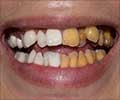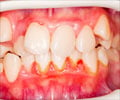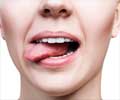A University of Oregon anthropologist has uncovered one of the most intriguing questions related with evolution- why do women get more cavities than men.
A University of Oregon anthropologist has uncovered one of the most intriguing questions related with evolution- why do women get more cavities than men.
According to John R. Lukacs, a professor of anthropology who specializes in dental, skeletal and nutritional issues, the key behind better dental health of men as compared to females is reproduction pressures and rising fertility.He also said that women suffered a more rapid decline in dental health than did men as humans transitioned from hunter-and-gatherers to farmers and more sedentary pursuits, because of dramatic changes in female-specific hormones.
For the study, Lukacs carried out a comprehensive review of records of the frequencies of dental cavities in both prehistoric and living human populations from research done around the world.
He assessed the frequency of dental caries (cavities) by sex to show that women typically experience poorer dental health than men.
"The role of female-specific factors has been denied by anthropologists, yet they attain considerable importance in the model proposed here, because the adoption of agriculture is associated with increased sedentism and fertility," said Lukacs.
He added: "I argue that the rise of agriculture increased demands on women's reproductive systems, contributing to an increase in fertility that intensified the negative impact of dietary change on women's oral health. The combined impacts of increased fertility, dietary changes and division of labour during the move into agricultural societies contributed to the widespread gender differential observed in dental caries rates today."
Lukacs' review found that women's higher rates of cavities are influenced by three main changes- female sex hormones, the biochemical composition and flow rate of saliva, food cravings, immune response and aversions during pregnancy.
He argues for a cumulative effect of estrogens, including fluctuations at puberty and high levels during pregnancy that both promote cavities and dietary changes.
Women produce less saliva than do men, reducing the removal of food residue from the teeth, and that during pregnancies the chemical composition changes, reducing saliva's antimicrobial capacity.
Lukacs indicated that women crave high-energy, sweet foods during the third trimester, as well as an aversion to meat in first trimesters.
He, however, said that they still do not have a clear idea how the factors combine to contribute to higher risk of cavities in women as they age.
The findings of the study are detailed in the latest issue of Current Anthropology.
Source-ANI
SRM/SK
 MEDINDIA
MEDINDIA



 Email
Email










